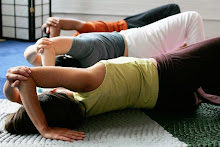
Fifty percent of my office floor is covered in papers, file folders, trash bags, and boxes. Things will start to look a lot worse before the turnaround begins and order is restored. It's the every-month-or-so-catch-up-on-filing rampage, and if I didn't dread it so much, it would be fun.
An hour or so on the floor with the stack of file folders should be sufficient to get things looking decent enough for clients to be here. I could just shove everything back into the closet--it's really not that bad--and deal with it another time. And then, there will be more to deal with, and it will take longer.
I'll move through stages of the project: from the minimum standard, "Clean up the mess" phase, to the organized and orderly phase, to the Glorious and Gleaming stage with the professional looking tabs I will create with my label maker. My goal for tonight is to pass stages one and two, and be ready for periodic sessions with the label maker this week. Then I can just maintain it and enjoy it.
Sometimes I see clients who describe themselves as "in a mess." They have perceived a deficit in themselves; a gap between the way things are and the way they'd like them to be. The activity that takes place in between is called "Work." Work doesn't have to be backbreaking and joyless, one eye on the clock, relieved to resume living when the whistle blows. Work can be the highest form of self-expression, transformational and satisfying. Work becomes drudgery when the effort expended is not converted into results. Frequently, my clients have struggled, fretted, efforted, and suffered as they begin to work on themselves and then abandon the project, stuffing the difficulties away until later. Then, they come to see me. Things sometimes seem to fall apart a bit before they begin to come back together.
Moshe Feldenkrais knew that it takes work to recover from an injury, regain function after a stroke, run faster, or play the piano beautifully. He developed a method of working with people to improve FUNCTIONING, so that maximum results can be obtained with a relatively low investment of effort. Work can be effective, enjoyable, and creative when struggle and striving disappear, and resources (physical and mental) are applied mindfully and efficiently to the desired outcome. The Feldenkrais Method "makes the impossible, possible; the possible, easy; and the easy, elegant" with mindful awareness, focus on process, and keeping things simple in the midst of complexity.
So with my paper organization, I'm going to go slowly; take frequent pauses; eliminate the unnecessary (papers and trash, discomfort, boredom, and whining); and be ready for a pleasant surprise at the end. My old approach might have been to bring in a bulldozer or build a bonfire. I'm going to try a gentler approach and see if I can enjoy myself. Here goes!



No comments:
Post a Comment